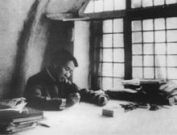
| All of Mao's poems are in the traditional Chinese verse style. Though Mao may not be one of the best Chinese poets, his poems are generally considered well-written and of high literary quality. As did most Chinese intellectuals of his generation, Mao received rigorous education in Chinese classical literature, and thus his skill in poetry is of little surprise. His style was deeply influenced by the great Tang Dynasty poets Li Bai and Li He. He is considered to be a romantic poet, in contrast to the realist poets represented by Du Fu. |
Many of Mao's poems are still very popular in China. They are frequently quoted in popular culture, literature and daily conversations. Some of his most well-known poems are "Changsha" (1925), "The Double Ninth" (1929.10), "Loushan Pass" (1935), "The Long March" (1935), "Snow" (1936.02), "The PLA Captures Nanjing" (1949.04), "Reply to Li Shuyi" (1957.05.11), and "Ode to the Plum Blossom" (1961.12). General consensus is that his pre-1949 works are superior. The Long March at the patten of Qilu (one poetry of Mao Zedong)
The Red Army fears not the trials of the Long March, Holding light ten thousand crags and torrents. The Five Ridges wind like gentle ripples, And the majestic Wumeng roll by, globules of clay. Warm the steep cliffs lapped by the water of Jinsha, Cold the iron chains spanning the Dadu River. Min Mountain's thousand li of snow joyously crossed, The three Armies march on, each face glowing.
Actually, the Long March was done by three CPC armies separately. One was Mao's 1st Red Army from Jiangxi Soviet, another was Zhang Guotao's 4th Red Army from Hubei soviet, the third one was He Long's 2nd Red Army from west part of Hubei. Here, Mao was glad all three Red Armies were together. |